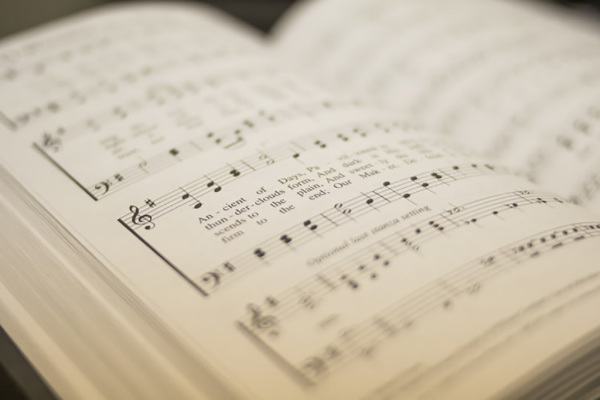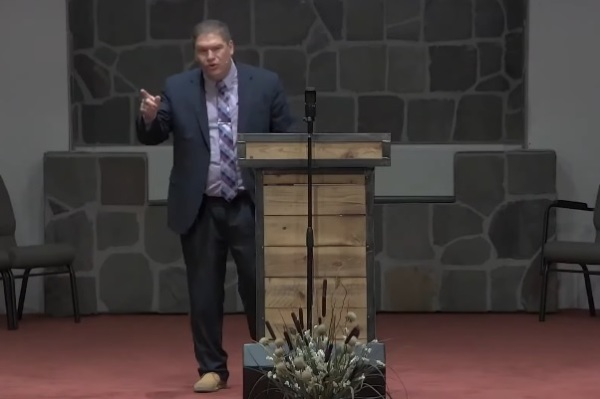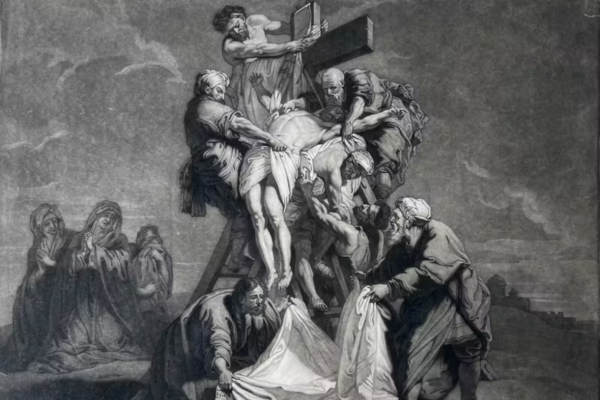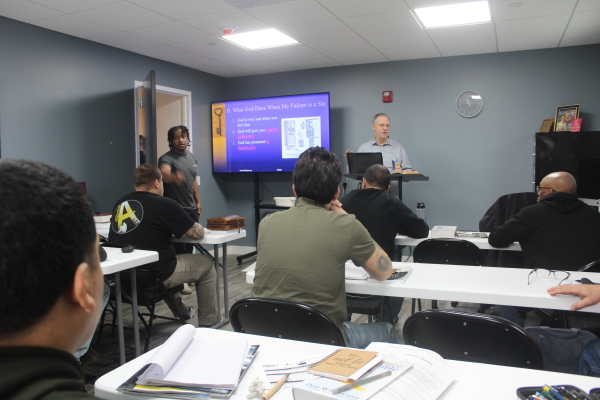Interview: Jack Levison Talks 'Fresh Air,' the Holy Spirit and How Christians Can Live an 'Inspired Life'
CP: That leads to chapter six, where you discuss the Antioch community. You suggest that this is the model Christian communities today need to follow.
Levison: Eugene Peterson has written against this idea of the powerful pastor – we need to get a pastor who will draw people in, who's a great speaker. One of the first things I think that's so important in Antioch is this multicultural leadership team. We all want to be in mission, but very often we have a white male pastor. We all want to be in mission. Antioch was ready for mission because of a multicultural leadership. Antioch was ready for mission, ready for a revelation of the word of God, because they were generous. They'd already given money before they even knew what the famine would entail, they had given money to the church in Jerusalem. Antioch was learned. They spent a year at the feet of Paul and Barnabas. So everyone was in place for a revelation of the word of God. This is what I think: I think there are no shortcuts to spirituality. There are no shortcuts to a vibrant church. This church was generous, learned and so responsive – responsive to the word of a prophet. And then what were they doing when they received that word? They were praying, worshiping and fasting.
Rather than all of these quick-fix ways of making the church grow, building our outreach – five steps to a vibrant church, I think there are long-term disciplines we put in place: learning, generosity, worship, fasting, prayer, with a diverse leadership team. I think this is the model for our diverse world. In Manhattan, you ride a subway car and it's ethnically diverse. So often you go to the church and it's more monolithic. I think these characteristics are the model. If you ask me, I would say these are the characteristics of the 21st century Church, of how we become salt and light in our world. No shortcuts, these are long-term endeavors. You're not hiring someone to do mission. You're not hiring a great preacher. You're building in disciplines and diversity from the ground up. I do think this is exactly the model we need for the 21st century Church.
CP: In chapter 7 and also earlier in the book, you use Jesus' baptism and immediate wilderness experience to comment on the Spirit's behavior or function. You write on page 174: "The gentleness of a dove following Jesus' baptism has been left in the dust by the violent force of the spirit." How can Christians today grasp this reality, this kind of dual nature to the spirit experience?
Levison: Yesterday, I start class in my intro with the Book of Jonah where everybody thinks it's about the whale or the fish. Then we read children's Bibles and all of them end with chapter 3, with everything fixed up: Jonah went to Nineveh and everything worked. None of the children's Bibles used chapter 4 where he's sitting under the tree moaning and groaning that he's hot, and really really bothered at God that Nineveh is going to get saved. Politically and personally in chapter 4, we see, I think, a mirror of ourselves. Sort of we want more of a Disney theology that ends very positively on a high note. We want things wrapped up nicely, and we want personal comfort and political security. Now, I don't know in North America how to change that. I mean if you look at books on the Holy Spirit, they're all about being fulfilled and being uplifted and being joyful and living in a victorious life. But, is it not possible that the victorious life comes when we're in hostile arenas? It may not be that worship service, it may not be that great sermon. It may be being in the trenches, being uncomfortable, hungry, alone, but very much doing God's bidding.
How we do this, I don't know. The first thing we do is we read our Bibles. And when we read our Bibles, in the earliest Gospel, the Gospel of Mark, in the earliest chapter of the earliest Gospel, the Gospel of Mark, it's very clear that the verb, after the Spirit descends, the verb used for pushing Jesus away is the same verb used for exorcisms and kicking the money changers out of the temple. So it will probably not be a comfortable transition to this second side of the Holy Spirit. When the Spirit comes down Jesus is uplifted, he does regain intimacy with God. But then after he has that intimacy and uplift, he's expelled, exorcised into the wilderness. And I think that has to be the work of the Holy Spirit and our ability to respond to the Holy Spirit as the Spirit pushes us into hostile arenas. So again, I think if we're listening, and learning and quieter and disciplined, it may be possible that we'll hear the Holy Spirit moving us into hostile arenas. I think as long as we're distracted and active and productive, we may not have the capacity to hear the Spirit move us, expel us into hostile arenas. I have no quick-fix answer to that. I'm very much apart of American culture in that respect.
CP: You close out the book by commenting on two polar ideas of the Holy Spirits' activity or presence using a dead example of a church meeting versus a very lively example. You express the concern that there are two Christianities and that you would like the Church to go forward as one. You spoke about the issue of survival – express your concerns on that.
Levison: Maybe why I'm so careful to connect the spirit of God within us that we cultivate with the Spirit that comes upon us, because I think there may be a tendency in our world to want the Spirit to come upon us and change things in the blink of an eye, sort of the quick-fix transformation. The Spirit is the one that makes me love people – yes, that's true because God has given all of us a spirit, which when we cultivate it, leads us to love people. So I think [with the] spontaneity one can often exclude the daily disciplines and the hard work of being spiritual. On the one hand, I worry that this emphasis on spontaneity de-emphasizes discipline. On the other hand, I also worry that there are going to be two churches. I mean how many years now, in what 10 years, there'll be a billion Pentecostals worldwide? I'm a United Methodist, my church is dwindling. So what's going to happen?
When I studied, and this again came out of my scholarly study of the New Testament, I noticed especially in the Book of Acts, the Spirit was very present when people were studying and then speaking out of Scripture. The Holy Spirit comes upon Peter in chapter 4 of the Book of Acts, he's filled with the spirit and what does he do? He quotes from Psalm 118 verse 22. When he's filled with the Spirit, he's filled with Scripture. The same thing is in John's Gospel, where the work of the Holy Spirit, the Spirit of Truth, is to lead people to understand Jesus by leading them back into the Old Testament. It happens twice in the Gospel of John, where the disciples who didn't understand things during Jesus' life, looked back at the event or the saying in light of the Old Testament and come to an understanding. That's the work of the Spirit. I think the Spirit principally takes us to Jesus in light of the Jewish Bible, or the Old Testament. So I'd like to see a Church much more serious about learning who Jesus is through the New Testament, in light of the Old Testament's illumination on the New.
I really believe that if we study together and earnestly desire not to learn about predestination, not to learn about speaking in tongues, not to learn so much about the right baptism, but to learn about Jesus Christ as he lived on the earth, with the illumination of the Holy Spirit and study of the Old Testament, that perhaps we can get underneath all of these divides, all of these tensions toward schism, and live an inspired life and be an inspired Church.
At the end of the interview, Levison was invited to share any parting thoughts, to which he responded:
"I think if we live simply and live for the long haul, attend to the spirit God already has given us and continue to desire more of that spirit, more fullness, more vitality in that spirit, we can be individuals and a Church that are inspired. Then we don't have to tell people we have the Holy Spirit. Like in the Book of Daniel, or the story of Joseph, they'll us. They'll say, 'These people have something. These people live an inspired life. That's an inspired church.' And won't it be great when we don't have to tell the world so much what we have, but when the world can tell us what we as Christians have? That will be a good day."
The author, also known as John R. Levison, is a Professor of New Testament at Seattle Pacific University and has studied at Wheaton College, Cambridge University, and Duke University. He lives with his wife near Seattle. Fresh Air: The Holy Spirit for an Inspired Life is available online and in stores. Paraclete Press has published a downloadable discussion guide for the title on its website.






















